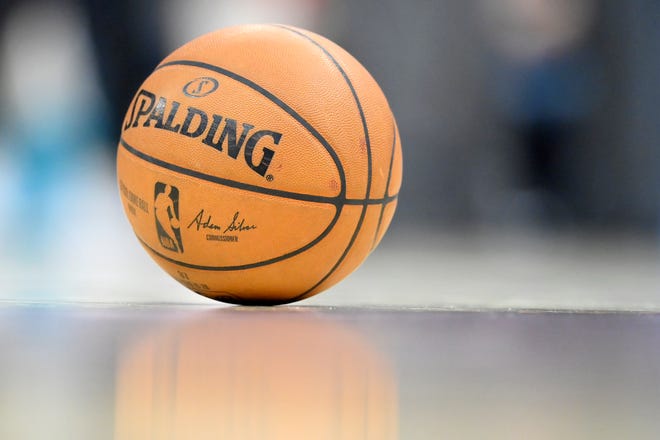Cardiac Screening Crucial for NBA Players Who Tested Positive for COVID-19

A view of an NBA game ball. David Richard, USA TODAY Sports
The hardest working muscle in an NBA player’s body will get extra attention if there is a COVID-19 positive test.
NBA officials and teams will play close attention to a player’s heart. Before a player returns from a positive test, he must satisfy specific requirements: isolation period, absence of symptoms, two negative tests at least 24 hours apart and cardiac screening.
Why cardiac screening?
“The concern is really an extension of what all of the professional teams are doing already, and that’s protecting their athletes from cardiac events more so than they have in the last five years or so,” cardiologist Matthew Martinez told USA TODAY Sports. “That extension now is with COVID-19 because initial reports said this had a high prevalence of involving hospitalized patients. Those were sicker patients and about 30% were reported to have cardiac involvement. That was what really tipped things off.”
In a study funded by the British Heart Foundation and published in the European Heart Journal last week, 55% of 1,216 patients from 69 countries “showed abnormal changes to the way the heart was pumping, with around one in seven showing evidence of severe dysfunction.”
Myocarditis, which is inflammation of the heart muscle, and clotting are two significant issues Martinez has seen in a patients. Both can lead to fatal heart conditions, said Martinez, who is the consulting cardiologist for the National Basketball Players Association and reviewed the NBA’s protocol with the league’s 13-person Cardiac Advisory Committee. Martinez is also the director of Sports Cardiology and co-director of the Chanin T. Mast Hypertrophic Cardiomyopathy Center at New Jersey’s Atlantic Health System’s Morristown Medical Center and lead cardiologist for Major League Soccer.
While much remains unknown and as researchers are learning more about COVID-19, the NBA ensured cardiac screen is part of its extensive health and safety protocols. An abundance of caution rules the day, and heart injuries from COVID-19 are something other sports will need to watch, too.
The screening is three-pronged: troponin testing – which can detect heart injury in the blood; electrocardiogram – which measures heart function; and an echocardiogram – which generates images of the heart to assess left ventricular function.
“All three have to be done, and it’s really a comprehensive way to screen for active inflammation or damage to the muscle as well as perhaps a prior episode,” Martinez said.
The cardiac screening requirements for NBA players are based on the “American College of Cardiology’s Sports & Exercise Cardiology Council recommendation and are the result of ongoing review by consulting cardiologists for NBA teams, the NBA’s consulting cardiologists at Columbia University, and the Players Association’s consulting cardiologist. They reflect a current consensus approach, recognizing that the complete clinical picture of COVID-19 and potential effects on cardiac health, including myocarditis in particular, are not yet fully understood, and may be modified in the future to reflect new information."
Even players who have not tested positive but have had symptoms associated with COVID-19 within the past three months also must undergo an evaluation.
“There are ongoing discussions between sports medicine specialists and cardiologists about ways in which COVID-19 can affect the heart,” said John DiFiori, the NBA’s director of sports medicine and chief of primary sports medicine and attending physician at New York City's Hospital for Special Surgery.
“Our cardiac screening protocols are a reflection of the very cautious approach we’re taking on any potential cardiac-related complications from the virus, because early research has shown that in some cases serious conditions can arise. We are working closely with the NBPA, and our collective group of consultants, to understand and apply the emerging data, given that our knowledge of this virus is limited since it first appeared only seven months ago.”
The NBA is also in a fortunate spot. In 2006, it began requiring players to undergo heart evaluations, including EKGs and echocardiograms. Doctors can look at previous data to compare.
Also, if a player tests positive, he must refrain from exercise for two weeks as part of the evaluation. The league's consulting cardiologist, in consultation with the team, must clear the player for on-court activity.
“Assuming there are no changes and the player is asymptomatic, then they start to re-acclimate to exercise and we look for symptoms,” Martinez said. “We have an advantage because we can continue to monitor them closely because we see them every day. It’s really something we’ve been able leverage and maybe say, ‘That looks interesting, let’s look at the prior one. No, still there then. That’s old news.’
“Players are being protected. That’s been the mantra for the NBA and NBPA, and this is a continued effort to make sure the athletes are safe. The idea behind it is to be conservative. It doesn’t apply to everyone, but in this unique population, we think it’s best serving them.”
Story Credit: https://www.usatoday.com/story/sports/nba/2020/07/19/nba-covid-19-positive-cardiac-screening-disney-bubble/5467847002/
Click here to SUBSCRIBE to our newsletters.
For as little as $1 per week, you can support preventative heart screenings and save a life! It only takes a minute to donate. Help us save a child's life today. Thank you. -The SafeBeat Team


